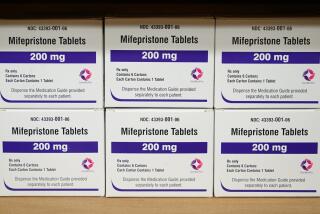Cost/benefit healthcare
- Share via
The Food and Drug Administration has reversed course on Avastin, recommending this week that the popular tumor inhibitor no longer be promoted as a safe and effective treatment for advanced breast cancer. The ruling drew howls from some patient advocates and many Republicans, who accused the Obama administration of trying to cut healthcare costs at the expense of cancer patients. Such criticisms are overblown; the Avastin decision was based on the drug’s poor performance in follow-up studies, not some callous cost/benefit analysis. Still, the ruckus illustrates how hard it is to persuade the public to accept limits on healthcare, particularly when they’re imposed by Washington.
Avastin is approved for several types of tumors, including lung and colon cancers. Two years ago, the FDA gave Avastin an accelerated approval for use in metastatic breast cancer on the condition that its manufacturer, Roche subsidiary Genentech, conduct additional studies to confirm the potential shown in an initial trial. Instead, the studies indicated that Avastin didn’t extend patient lives overall, nor did it inhibit tumor growth enough to outweigh the significant increase in harmful side effects seen in the additional trials.
The FDA’s decision, which Genentech is appealing, won’t prevent doctors from prescribing Avastin to patients with advanced breast cancer, but it is likely to stop insurers from paying for it. And with a price tag of about $8,000 a month, there aren’t many women who could afford to pay for Avastin out of their own pockets. Critics of the FDA’s move point to anecdotal evidence that the drug helped keep some breast tumors at bay for months, even years. Unfortunately, Genentech can’t tell in advance which of the bewildering variety of breast tumors will respond to the drug and which ones won’t. The FDA invited Genentech to propose new trials that might identify the patients most likely to benefit.
That’s one of the challenges faced by oncologists, who often cycle through a series of drugs for a patient before finding one that makes a difference. Avastin’s supporters say the chance that it could slow some tumors is enough to justify continuing its availability for patients with metastatic breast cancer, an incurable disease. But the task of finding the most effective treatment for each patient isn’t made easier by the availability of a drug that won’t help most of the people who use it.
The controversy over the decision raises the question: If the FDA shouldn’t decide whether a drug is safe and effective enough to use, who should? If the issue were left to insurers, the cost considerations the FDA is supposed to ignore would come right to the forefront. And if insurers were expected to pay for any drug that helped some patients, regardless of however many it didn’t, premiums would rise even faster than they already are.
Ultimately, the public has to trust someone to make a decision about what drugs, devices and procedures work. That trust depends on the decisions being made on a medical basis, not an economic one. And as the Avastin episode illustrates, even when decision makers say they don’t consider costs, they’ll still be accused of doing so — that’s just how politicized healthcare has become.
More to Read
Inside the business of entertainment
The Wide Shot brings you news, analysis and insights on everything from streaming wars to production — and what it all means for the future.
You may occasionally receive promotional content from the Los Angeles Times.










